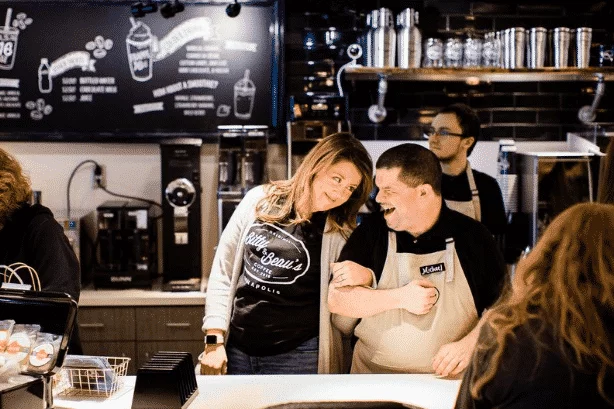By Anna-Louise Jackson, Bloomberg.
While businesses across the U.S. struggle to find enough employees, Bitty & Beau’s coffee shops say their attrition rate is near zero and they’re inundated with applications every time a location opens. That’s because the chain primarily hires workers from a demographic advocates say has an unemployment rate above 80%: people with intellectual and developmental disabilities. “There’s an untapped labor force of people with disabilities in every community,” says Amy Wright, who co-founded the company with her husband, Ben, six years ago. “Most of our employees have never had a job before.”
Almost 90% of the 350-plus employees at Bitty & Beau’s 11 locations have a disability, doing everything from working as baristas to helping plan strategy in the corporate office. The Wrights decline to share specifics, but they say Bitty & Beau’s is both fast-growing and profitable—no small feat in an industry dominated by the likes of Starbucks, Dunkin’, and Peet’s. “We’re trying to shift the way society thinks about people with disabilities from charity to prosperity,” Ben Wright says. “You can run a profitable business that employs people with disabilities.”
The couple were inspired to get into the business after two of their four children (son Beau, 17, and daughter Bitty, 12) were born with Down syndrome. Although neither parent had experience running a coffee shop or any other type of hospitality or retail operation—they met as actors in New York before Ben switched to a career in finance and Amy shifted her focus to raising the family—they decided to open their first shop after relocating to Wilmington, N.C. Initiatives with a similar mission exist as nonprofits, but the Wrights wanted Bitty & Beau’s to be a profit-generating company to ensure that it remains sustainable. “If the nonprofit world had been able to solve this,” Amy says, “it would’ve already.”
Businesses such as Bitty & Beau’s can play an important leadership role, says Silvia Bonaccio, a professor of workplace psychology at the University of Ottawa’s Telfer School of Management. Some advocates for disability employment say it would be better if all types of companies were to hire employees with disabilities rather than “segregating” them at places such as coffee shops, but that’s not happening. So it’s important, Bonaccio says, for someone to demonstrate the contributions such people can make. “Employers continue to overlook a significant pool of talent,” she says. “One business can be a catalyst for change.”
In 2020, Bitty & Beau’s shifted to a franchise model. On their own the Wrights could open only about one location each year, and they were fielding requests from people across the U.S. who wanted a shop in their town. The company says it’s on track to expand to 27 locations in more than a dozen states in the next year or so, and within a decade the Wrights aim to have at least one shop in all 50 states.

A Bitty & Beau’s in Athens, Ga.
Photographer: Kayla Renie/USAToday/IMAGN
The cost of opening a location ranges from $350,000 to more than $700,000, including a $40,000 franchise fee (roughly in line with what big fast-food chains charge). In exchange, franchisees are given the right to use the name, along with training and detailed guidelines for furnishing and operating the shop. The Wrights say that given the number of requests they get, a big part of their job now is vetting potential franchisees to ensure they’re going into the business with the right intentions and will abide by their rules for running a shop. “We say no to people more than we say yes,” Amy says.
At the recently opened outlet in Bethlehem, Pa., one wall is packed with clothing, beach towels, mugs, and other merchandise bearing awareness-raising messages like “radically inclusive” and “not broken.” Even the Wi-Fi password—“abletowork”—underscores the chain’s mission of providing jobs to people with disabilities. Every cup of coffee, pastry, and product sold comes with a handwritten note of gratitude.
Click here to read the full article on Bloomberg.



